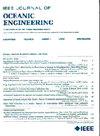大初始位置误差下基于群内距离测量的混沌初始化粒子滤波AUV聚类位置标定算法
IF 5.3
2区 工程技术
Q1 ENGINEERING, CIVIL
引用次数: 0
摘要
随着海上任务需求的日益多样化和复杂化,协同多自主水下航行器(auv)技术受到了广泛关注。在这一领域中,水下航行器群的位置标定技术是一个不可忽视的重要方面。传统的leader - follower AUV集群位置校准模型和算法利用了单个leader AUV或多个leader AUV与单个follower AUV结合的信息。然而,随着随动AUV规模的扩大,随动AUV信息的可用性也随之增加。因此,本文开发了一种新型的AUV集群位置校准模型,该模型既利用了leader和follower AUV之间的距离信息,也利用了follower - follower AUV之间的距离信息。分析了该模型的可观测性,在此基础上提出了一种混沌初始化粒子滤波算法用于水下航行器簇的位置标定。最后,通过实验对比了本文算法与粒子滤波算法在不同初始误差条件下的性能。结果表明,该算法在较低的初始误差下具有稳定的收敛速度和标定误差。在初始误差较大的情况下,收敛速度较快,有限时间内标定误差较小,稳定性增强。本文章由计算机程序翻译,如有差异,请以英文原文为准。
Chaotic Initialization Particle Filter AUV Cluster Position Calibration Algorithm Based on Intragroup Distance Measurement Under Large Initial Position Error
With the increasing diversity and complexity of maritime mission requirements, the technology of collaborative multiautonomous underwater vehicles (AUVs) has garnered widespread attention. In this domain, the positional calibration technology of AUV clusters is an integral aspect that cannot be overlooked. Traditional leader–follower AUV cluster positional calibration models and algorithms have utilized information from either a single leader AUV or multiple leader AUVs in conjunction with a single follower AUV. However, with the expansion of the scale of follower AUVs, the availability of follower–follower AUV information increases. Consequently, this article develops a novel AUV cluster positional calibration model that leverages both the distance information between leader and follower AUVs, and the follower–follower AUV distance information. The observability of this model is analyzed, and building upon this, a chaos-initialized particle filter algorithm for AUV cluster positional calibration is proposed. Finally, experiments are conducted to compare the performance of the algorithm presented in this article with the particle filtering algorithm under different initial error conditions. The results demonstrate that the proposed algorithm exhibits stable convergence speed and calibration error at low initial errors. At high initial errors, it achieves faster convergence, lower calibration error within a finite time, and enhanced stability.
求助全文
通过发布文献求助,成功后即可免费获取论文全文。
去求助
来源期刊

IEEE Journal of Oceanic Engineering
工程技术-工程:大洋
CiteScore
9.60
自引率
12.20%
发文量
86
审稿时长
12 months
期刊介绍:
The IEEE Journal of Oceanic Engineering (ISSN 0364-9059) is the online-only quarterly publication of the IEEE Oceanic Engineering Society (IEEE OES). The scope of the Journal is the field of interest of the IEEE OES, which encompasses all aspects of science, engineering, and technology that address research, development, and operations pertaining to all bodies of water. This includes the creation of new capabilities and technologies from concept design through prototypes, testing, and operational systems to sense, explore, understand, develop, use, and responsibly manage natural resources.
 求助内容:
求助内容: 应助结果提醒方式:
应助结果提醒方式:


